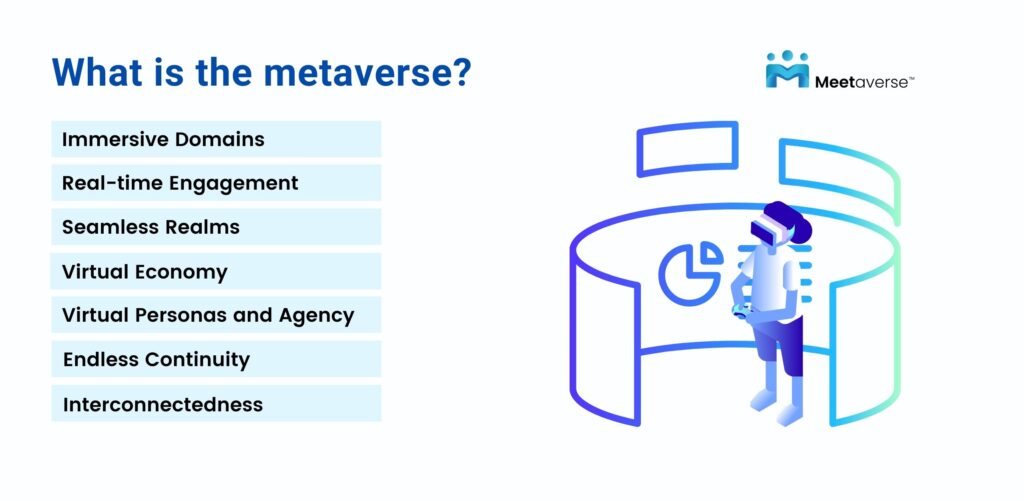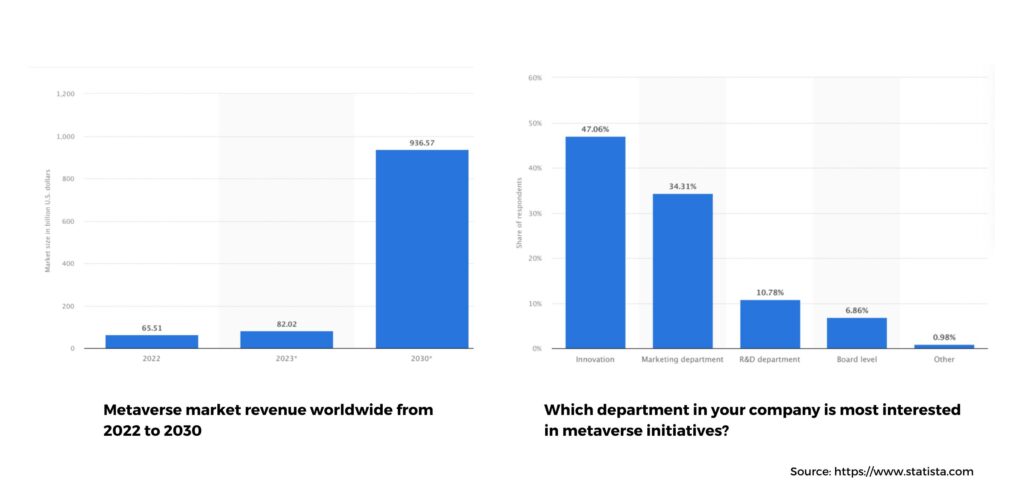In the changing digital world, Metaverse Marketing is a new way to market. This new marketing experience is transforming how brands engage with audiences. It’s not just a small change – it’s a big one that’s making marketers think about how they connect with customers and how people experience brands.
The term “marketing in the metaverse” goes beyond a simple change in approach. It shows marketers are thinking about how they connect with customers, tell stories, and how people feel about brands.
In the world of computers and technology, the metaverse is becoming a real thing, not just a story. This makes the marketing metaverse important because people want cool online experiences.
As the demand for immersive digital experiences grows due to limited physical interactions, leading to the adoption of:
Defining the metaverse lacks unanimous agreement, but most interpretations share common attributes:

In the broad sense, the metaverse is an immersive realm where users connect and transact as avatars. Understanding involves:
These elements shape a multidimensional metaverse that redefines digital engagement. It’s an evolution merging imagination and innovation, bridging fiction to reality. The metaverse opens new dimensions of human interaction and engagement as virtual worlds, immersive experiences, and digital identities intertwine.

The rise of marketing in the metaverse means new, exciting ways to create immersive brand experiences. This has led to special places like Meetaverse, made just for events and brand stuff in the virtual world.
Meetaverse offers marketers innovative ways to harness the power of the online world, allowing them to turn their ideas into engaging experiences. By combining the need for fun brand connections with cutting-edge technology, Meetaverse has created a space where brands can thrive.
This mix changes how marketing works and makes it new. It also changes how brands talk to people in this big world of new things.
The metaverse marketing meaning revolves around utilizing immersive features to craft impactful brand interactions. This strategy empowers marketers to construct narratives that foster emotional connections, reshaping engagement dynamics.
Through interactive and immersive storytelling, the metaverse for marketing empowers brands to convey messages, establish connections, and create unforgettable memories, all within a dynamic virtual landscape.

Here’s how the metaverse empowers marketers:
The metaverse in marketing is a big change. Brands can talk to many different people, no matter where they are. Young folks, like Gen Z and millennials, really like this. It’s a place where they can have fun experiences and learn about brands. It aligns perfectly with the latest immersive marketing trends that focus on creating engaging and interactive experiences that resonate with the younger demographic.
Using the metaverse in marketing is like being ahead with technology. Brands can make strong connections with the people they want to talk to. This new way matches how people change, opening up many cool marketing opportunities.
Metaverse the new marketing universe, changes how brands do marketing, making it more engaging and captivating. This helps brands talk to people better and stand out from others. When brands use fun stuff that people can play with, it makes people notice them online and makes them like brands more in real life.
This cool change fits perfectly with how the metaverse is getting bigger: Statista says the global VR market will grow a lot, going from a small $5 billion in 2021 to a big $12 billion in 2024. This helps both businesses and people. Brands can leverage marketing and metaverse to craft engaging narratives that capture people’s attention and enhance the effectiveness of their marketing efforts.
When marketing and the metaverse come together, they focus on interaction and being involved. This is different from the usual methods that do not engage people as much.
Nowadays, people want real and exciting experiences. Mixing marketing with the metaverse is a big deal, changing how brands talk to people and how they connect.
| Aspect | Metaverse Marketing | Traditional Marketing |
| Branding Experience | Empowers brands to create immersive virtual realms embodying identity | Often relies on videos, images, and text |
| Customer Interaction | Offers unique interactive experiences within personal space | Limited to passive engagement through ads and content |
| Competitive Edge | Confers competitive edge through innovation and novelty | May struggle to stand out due to the saturation of traditional methods |
| Challenges and Risks | Presents risks such as measurement complexities and gradual adoption | Challenges vary but may include ad effectiveness and targeting |
| Brand Autonomy | Fosters decentralization, allowing brands to create their universe | Relies on existing platforms and channels |
Marketing in the metaverse benefits from a revolutionary playground, reshaping strategies and captivating audiences uniquely.
Integrated into games like Fortnite, Minecraft, Illuvium, and Axie Infinity, this digital realm immerses individuals deeply. Renowned brands like Nike, Samsung, and Coca-Cola leverage the metaverse potential, distinctively connecting with consumers. As the metaverse dominates digital marketing, traditional approaches transform, possibly becoming obsolete.
The metaverse is seeing significant participation from companies using metaverse for marketing. Success stories highlight the strategy’s effectiveness, seen in giants like Fortnite and Roblox engaging audiences. Vans introduced a virtual skatepark on Roblox, while Gucci showcased digital luxury with virtual sneakers for “wearing” across AR platforms. These campaigns showcase the metaverse’s creativity and engagement.
The metaverse’s emergence enables unparalleled customer engagement, letting brands craft interactive narratives for emotional connections. Empowering active participation lets customers shape experiences, cultivating trust and loyalty. As users navigate immersive landscapes, profound engagement with brand content becomes standard.
The impact of metaverse on marketing is evident through platforms like Meetaverse, which emerge as potent tools for reshaping brand experiences in the digital landscape. Our platform presents a host of distinct advantages that greatly enhance marketing endeavors:
By seamlessly integrating Meetaverse into marketing strategies, brands can forge enduring and impactful connections with their audience, leveraging its adaptable features and immersive settings to establish profound engagement.
Meetaverse works like a real-life customer journey, everything is in one place, making the path smoother for leads and your marketing team.

In this changing world, marketing in the metaverse is a chance to try new things and be creative. Metaverse opportunities for business have opened up a dynamic space for marketers to pioneer new approaches and test creative strategies. And this is where the Chief Metaverse Officer (CMO) comes into play. The CMO is a key figure responsible for strategizing how to harness the potential of the metaverse for innovative marketing endeavors.
This convergence of marketing and the metaverse offers an arena for marketing in the metaverse an opportunity for innovation and experimentation, driving remarkable outcomes and transforming brand interactions.
Metaverse marketing best practices entail exploring innovative strategies that drive exceptional outcomes and reshape brand interactions.
It’s like an open door for marketers to test new ideas and see what works. The meeting of the marketing and metaverse is a big chance for marketers to be creative and try new things, which can lead to great results and change how brands connect with people. The best ways to do marketing metaverse are about trying new ideas and making brand connections better.
In short, doing marketing on metaverse means trying new things and seeing what works. It’s a way for businesses to come up with excellent ideas to get people interested and connected.
Exploring the metaverse for marketers unlocks a realm of possibilities:
In the world of metaverse marketing best practices:
As the metaverse grows, marketers need to mix its main parts together. This means making experiences people won’t forget, getting folks involved, using special things, and using ads that fit right in.
These strategies offer a unique opportunity to capitalize on the emerging digital realm.
The future of marketing and the metaverse has big chances for brands to grow. Being part of this new world is important to stay ahead. Brands that join the metaverse can connect in new ways, changing how they succeed.
McKinsey’s info shows how strong the metaverse is growing. In 2022, people invested more than $120 billion. That could jump to $5 trillion by 2030.
Big games like Fortnite, Minecraft, Illuvium, and Axie Infinity mix in metaverse stuff. And big names like Nike, Samsung, and Coca-Cola use the metaverse to talk to customers. This is a big change. The metaverse could make old marketing ways not work anymore.
Delving into the realm of marketing on the metaverse, here are essential steps for a successful approach:
Opportunities:
Challenges:
Strategic Approach:
The metaverse is not just a concept but a transformative reality, reshaping how brands engage with their audiences. Metaverse marketing offers a paradigm shift, crafting immersive experiences that forge emotional connections and transcend traditional strategies. The virtual world is becoming tangible, and brands must adapt or risk becoming obsolete.
Projected to be a $936.6B market by 2030, metaverse marketing is here to stay. With giants like Meta, Fortnite, and Minecraft in the arena, competition is fierce. The rise of ad spending within this realm underscores its potential as a powerful marketing platform. The metaverse isn’t just a playground; it’s a market that demands attention.
Meetaverse is an innovation hub, enabling brands to convert ideas into engaging experiences. This platform merges technology and branding to create a space where brands can thrive. Metaverse marketing isn’t a trend; it’s a pivotal shift. It empowers brands to transcend boundaries, engage diverse audiences, and nurture lasting connections.
Yet, challenges like privacy and ethical concerns loom. Transparency and adaptability are essential in this evolving landscape. In conclusion, metaverse marketing isn’t just a possibility; it’s the future. For brands to transform their interactions with consumers and engage their desired audience, they must embrace the metaverse.
Book your Meetaverse demo call now and take the first step towards redefining your brand’s future.
Metaverse platforms are taking immersive branding strategies to the next level...
read moreUnlock the metaverse’s potential for business brands with our detailed gui...
read moreIn 2024’s metaverse, technology and commerce combine....
read more